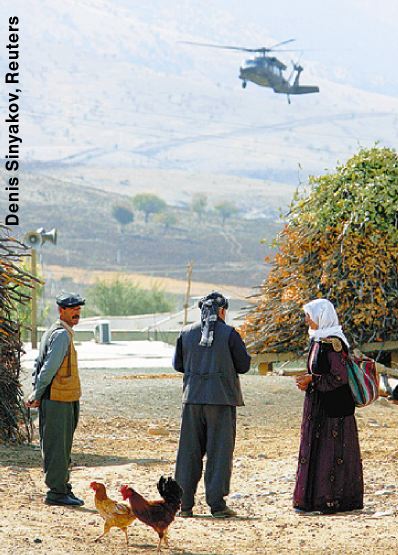 |
||
|
Turkey's EU Road Still Rocky
|
||
|
A European Commission progress report on Turkey's accession praises its handling of the political crisis, slams military control and rights violations GEORGE GILSON ONE YEAR after the European Commission partially suspended accession talks with Turkey for not implementing a customs union with the Republic of Cyprus, the commission's annual progress report addresses a litany of human rights abuses. |
 A Turkish military helicopter flies over Kurds in the southeastern province of Sirnak, bordering Iraq, on November 8. Kurdish human rights issues are among those cited by a European Commission report on Turkey's progress to membership |
|
| president and shortening the government term from five to four years, it criticises intervention of the military in Turkish politics, including in this year's presidential race. "The General Staff directly interfered with the April 2007 presidential election by publishing a memorandum on its website expressing concern at the alleged weakening of secularism in the country," the report underlines. That intervention had raised fears of even a military coup against the Islamist government. "The armed forces continued to exercise significant political influence," the report says. Secularism, Cyprus and Kurdish issues are among the policy areas in which senior military officers publicly intervened. Repeated attempts by the military to limit academic research and public debate and to target the press remain a problem, as does the lack of parliamentary oversight of military expenditures. A 1997 protocol still allows domestic security operations by the military without civilian approval. In short, there has been "no progress in ensuring full civilian supervisory functions over the military" and "the tendency for the military to make public comments on issues going beyond its remit, including on the reform agenda, has increased". Serious questions about "independence and impartiality" of the judiciary were raised by the constitutional court's rulings on the presidential election. The ruling that a two-thirds parliamentary quorum was needed in the first two rounds, which blocked foreign minister Abdullah Gul's election, and the court's introduction of a one-third blocking minority, "led to strong political reactions and allegations that the Constitutional Court had not been impartial". A whopping 330 European Court of Human Rights judgements against Turkey in the last year confirm that rights violations remain a major problem. Prosecution of torture cases was found lax, but prosecution of the expression of non-violent opinions doubled in 2006 (half involved "insulting Turkishness"). A human rights advisory board under the PM's office was shut down in 2004 and not reopened. The January 2007 murder of Armenian journalist Hrant Dink (who faced criminal charges for writing about the Armenian genocide), which brought a sea of protesters to the streets of Istanbul, is given a full paragraph in the report. The Turkish government on November 7 said it will abolish article 301 of the penal code, under which both Dink and Nobel laureate Orhan Pamuk were prosecuted for insulting Turkishness. Broad violations of freedom of religion remained a major problem, highlighted by the April murder of three Protestants in a religious publishing house in Malatya. The Orthodox patriarchate Systematic violations of the rights of the Ecumenical Patriarchate, the first-ranking church for 300 million Orthodox Christians worldwide continued. Turkey refuses to allow non-Turkish nationals to become patriarch, restricting the candidates to a dwindling Greek minority. It has also banned the use of the title "ecumenical", stating that the patriarchate is only authorised to perform religious functions for the Greek Orthodox minority in the country. The court also ruled that the patriarchate does not have any legal personality. The report notes that the patriarchate's Halki Theological Seminary remains shut by the state, despite strong US and international pressure to allow its operation. Widespread violations of the Greek minority's rights remain a serious problem. "The Greek minority continues to encounter problems with education and property rights," the report underlines, particularly noting violations on the northern Aegean islands of Imvros and Tenedos. "Overall, Turkey has made no progress on ensuring cultural diversity and promoting respect for, and protection of, minorities in accordance with European standards," the commission stresses. The report notes that the Turkish parliament has not revoked a 1995 casus belli against Greece if Athens extends its territorial waters, and Athens' complaints about Turkish violations of Greek airspace. Peaceful resolution of disputes is a requirement in Turkey's negotiating framework, it says. |
||
|
|
||
(Posting Date 19 November 2007) HCS readers can view other excellent articles by this writer in the News & Issues and other sections of our extensive, permanent archives at the URL http://www.helleniccomserve.com./contents.html
All articles of Athens News appearing on HCS have been reprinted with permission. |
||
|
||
|
2000 © Hellenic Communication Service, L.L.C. All Rights Reserved. http://www.HellenicComServe.com |
||

